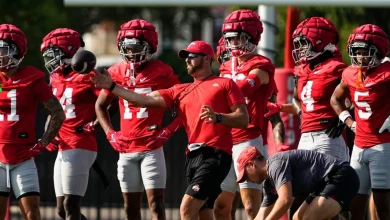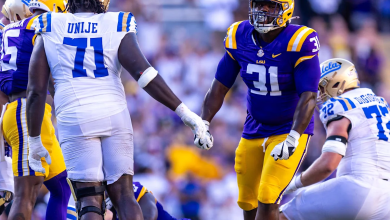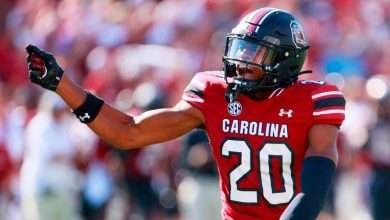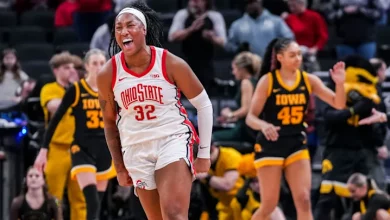Former LSU Football Commit Bryce Underwood Details Reason Behind Flipping to Michigan
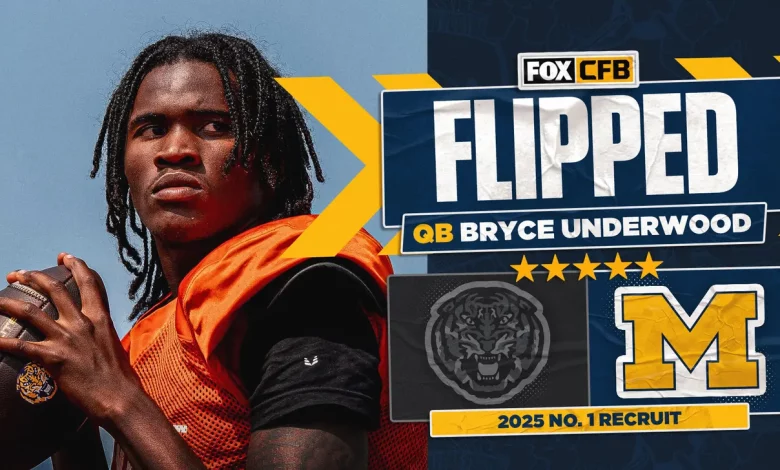
The recruitment of five-star quarterback Bryce Underwood was one of the most closely followed stories in college football during the 2025 recruiting cycle. Underwood, a dynamic and highly sought-after talent, initially committed to LSU, a school known for developing top-tier quarterbacks and competing at the highest level in the SEC. However, in a surprising turn of events, Underwood made the decision to decommit from LSU and flip his commitment to the University of Michigan, signaling a major shift in his college football future.
In this in-depth feature, we’ll explore the reasons behind Underwood’s decision to flip from LSU to Michigan, the factors that influenced his change of heart, and what the move means for both programs going forward. From family influences to Michigan’s quarterback development, we’ll dive into the key elements that played a role in his recruitment and the decision to change course.
1. The Initial Commitment to LSU: A Dream Come True
Bryce Underwood, a native of Detroit, Michigan, had been on the radar of major college football programs for years before making his initial commitment to LSU. His decision to commit to LSU was a major win for Tigers head coach Brian Kelly and his staff, who had been recruiting Underwood for months. Underwood’s decision to pledge to LSU was rooted in the program’s tradition of producing high-level quarterbacks and competing at a national level.
For Underwood, LSU presented an opportunity to play in one of the most competitive conferences in college football—the SEC—while developing under a coaching staff with a strong track record of success. His decision was also influenced by the prestige and legacy of LSU’s football program, particularly the success of former quarterbacks like Joe Burrow, who won a national championship and a Heisman Trophy. LSU’s offensive system, designed to maximize a quarterback’s talents, seemed to be a perfect fit for Underwood’s skill set.
However, as time passed and Underwood continued to evaluate his options, other factors came into play that would ultimately shift his perspective. Despite the allure of LSU, something about the program no longer felt like the right fit for the young quarterback.
2. The Shift: Family Influence and Strong Ties to Michigan
As Underwood’s recruitment process continued, one of the most influential factors in his decision to decommit from LSU and flip to Michigan was the strong pull of family ties. Growing up in Michigan, Underwood had a deep connection to the state, its culture, and its football community. His family was a big part of his life, and their input carried significant weight in his recruitment process.
Michigan, located just a few hours away from Underwood’s hometown, represented not only a chance to stay closer to home but also a program with a deep history of success. Underwood’s family members had strong Michigan allegiances, and the opportunity to play for the Wolverines was seen as a chance to stay close to home and represent his home state on a national stage.
“I have a lot of family in Michigan, and they were always supportive of my decision to go to LSU,” Underwood said in an interview after decommitting. “But as I started to look at the bigger picture and think about my future, it became clear that Michigan just felt like the right place for me. It’s not just about football—it’s about family and being close to them, and that’s a big part of my decision.”
The relationship with his family was something Underwood couldn’t ignore. As a young player with a bright future, the support system he could rely on was something he wanted to be near. Michigan gave him that opportunity, which became a major factor in his decision to change his commitment.
3. Michigan’s Quarterback Development and Coaching Staff
Another key factor in Underwood’s decision to flip his commitment from LSU to Michigan was the Wolverines’ track record of developing quarterbacks. While LSU certainly has a history of producing successful quarterbacks, Michigan’s coaching staff had a compelling pitch for Underwood’s future in the program.
Michigan head coach Jim Harbaugh, known for his ability to develop quarterbacks at the highest level, was a major influence in Underwood’s recruitment. Harbaugh’s history of working with quarterbacks in both the NFL and college football made him an appealing figure to Underwood, who saw the opportunity to develop under one of the best minds in the game.
“I’ve always been a fan of Coach Harbaugh and what he’s been able to do with quarterbacks,” Underwood explained. “He’s been in the NFL, and he knows what it takes to make a quarterback successful. I want to get to the next level, and Michigan offers me the best chance to do that.”
Harbaugh’s reputation for working with top-tier quarterbacks, including his success with players like Andrew Luck at Stanford and more recently with J.J. McCarthy at Michigan, made a strong impression on Underwood. Michigan’s offense, designed to highlight the strengths of its quarterbacks, also appealed to Underwood’s skill set as a dual-threat player capable of making plays both through the air and on the ground.
Underwood felt confident that Michigan would provide him with the best chance to maximize his potential and develop into an elite quarterback. The opportunity to work under Harbaugh and his coaching staff made the Wolverines a strong contender in Underwood’s recruitment.
4. The Winning Tradition at Michigan
In addition to the family ties and the quarterback development potential, another compelling factor in Underwood’s decision was Michigan’s tradition of winning. While LSU has been consistently competitive in the SEC, Michigan’s recent resurgence under Harbaugh also played a major role in Underwood’s decision to flip.
Michigan’s success in recent seasons, including their College Football Playoff appearance and Big Ten championships, showcased the program’s trajectory under Harbaugh’s leadership. The Wolverines had proven that they could compete with the best teams in the nation, and Underwood recognized that Michigan was a program on the rise.
“The program is on the up, and I want to be a part of that,” Underwood said. “I want to be part of something special, and I believe Michigan has all the pieces in place to win championships and compete at the highest level.”
The chance to join a program that had a chance to contend for a national title and a playoff berth each season made Michigan even more attractive to Underwood. He saw the opportunity to contribute to the team’s success and potentially lead them to even greater heights in the future.
5. LSU’s Reaction and the Importance of Player-Fit
While Underwood’s decision to flip to Michigan may have been a disappointment to LSU, the Tigers’ coaching staff understood that recruiting is about finding the right fit for each player. Brian Kelly and the LSU coaching staff were well aware that Underwood’s decision to leave the program was based on personal and professional factors that went beyond the X’s and O’s of football.
“It’s always tough when you lose a player like Bryce, but we understand his decision and respect it,” Kelly said in a statement after Underwood’s flip. “At LSU, we always want players who are fully committed to our program and our culture, and we wish Bryce the best moving forward.”
Kelly’s focus on finding the right fit for the program remained unchanged. LSU would continue to recruit quarterbacks and build their roster, even if that meant moving forward without Underwood. The Tigers’ focus would shift toward other top-tier quarterbacks and ensuring the team’s success in future seasons.
6. What Does the Future Hold for Bryce Underwood?
As Bryce Underwood prepares to make the transition to Michigan, he is focused on his future in Ann Arbor. While flipping his commitment from LSU to Michigan was a significant move, Underwood knows that his work is just beginning. He will have to compete for a starting spot in the Wolverines’ quarterback room, but given his talent and the trust that Harbaugh and the coaching staff have in him, it’s clear that Underwood has the potential to become a cornerstone of the Michigan offense in the years to come.
“I’m excited to get to Michigan, work with the coaching staff, and prove myself,” Underwood said. “I want to make an impact right away and help Michigan win championships.”
With Underwood now part of Michigan’s future, it’s clear that the Wolverines have a bright future ahead. His decision to flip his commitment to Michigan has further solidified the program’s position as a national contender and a destination for top-tier talent. Whether or not LSU can fill the void left by Underwood remains to be seen, but one thing is certain: both programs will continue to shape the future of college football.



